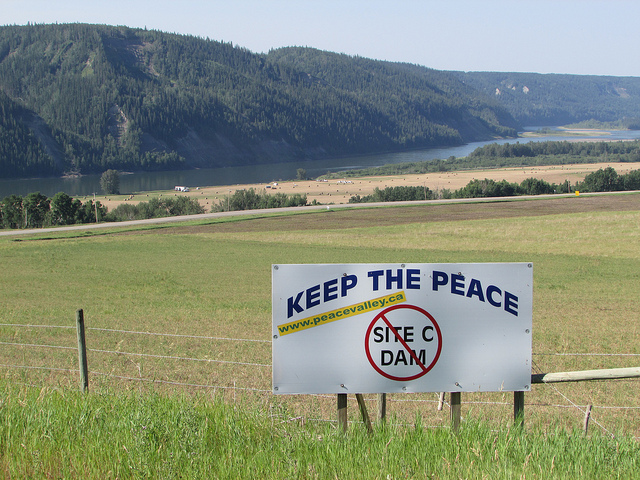Like this article? rabble is reader-supported journalism. Chip in to keep stories like these coming.
Treaty 8 members and allies opposing the Site C dam have set up a protest camp at Rocky Mountain Fort on the Peace River.
Site C is a 60-metre high, 1,050-metre-long earth-filled dam and hydroelectric generation station being built on the Peace River between the communities of Hudson’s Hope and Taylor on Treaty 8 territory in northeastern British Columbia. It will create an 83-kilometre-long reservoir and flood about 5,550 hectares of agricultural land southwest of Fort St. John. It will also submerge 78 First Nations heritage sites, including burial grounds and places of cultural and spiritual significance.
The Alaska Highway News reports, “As of December 14, it was not known how many people were living at the camp. …The area is slated for clearing, which will take place through the first three months of 2016 [and] at some point, boat traffic will be restricted, making site access an issue… [Peace Valley Landowners Association activist Ken] Boon said it remains to be seen whether there will be a confrontation over the site. ‘I guess we’ll see,’ he said. ‘[Hydro] keeps saying they’re going to put [construction] buoys in, and I see they say that initially, boats will be able to pass through that area. So I guess we’ll see what they decree.'”
Last week the Globe and Mail reported, “[West Moberly First Nations Chief Roland Wilson] went to Ottawa hoping for sit-down meetings with several ministers. When he couldn’t get them, he walked into the [Liberal caucus] Christmas party… Mr. Willson asked the federal government to hit pause on [Site C] to allow time for a review of the assessment process and to look for alternative energy sources. With site preparation work already under way on the river, it might seem his trip to Ottawa came too late. But he’s hoping Mr. Trudeau meant it when he wrote in his mandate letters to ministers: ‘No relationship is more important to me and to Canada than the one with Indigenous Peoples.'”
That article adds that the prime minister has declared his government will implement the United Nations Declaration on the Rights of Indigenous Peoples. “[That] declaration requires states to consult with indigenous people ‘in order to obtain their free and informed consent prior to the approval of any project affecting their lands or territories and other resources.’ Mr. Wilson’s message is that his people have not consented to Site C, which will flood 57,000 acres, drowning traditional hunting, fishing and trapping areas, and an unknown number of graves and sacred sites.”
Just last month, Assembly of First Nations national chief Perry Bellegarde and Amnesty International secretary-general Alex Neve wrote, “These impacts are not in question. A federal-provincial environmental impact assessment concluded that the Site C dam would severely undermine the rights of Indigenous peoples. The review also concluded that this harm could never be undone. The Harper government decided that, despite this finding, the project was nonetheless ‘justified’ through cabinet-level decision making powers the government gave itself under the Canadian Environmental Assessment Act, 2012.”
Despite this and ongoing legal challenges against the dam, B.C. Hydro began construction on the dam this summer and has reportedly already spent $423 million on the $9-billion project. On Nov. 25, the Canadian Press reported, “[Chief Wilson] described the province’s decision to carry on with construction as a ‘standard tactic’ used against opponents of infrastructure projects. ‘They try and get as much done to go in front of the courts and say, ‘Well look, we’ve spent all this money. You can’t shut us down now,’ he said… ‘I hope [the province] doesn’t get too far involved because there’s still a strong possibility we could get this project shut down.'”
Grand Chief Stewart Phillip of the Union of British Columbia Indian Chiefs has recently stated, “With no less than three court cases underway in which First Nations, farmers and others oppose federal and provincial approvals of Site C, the federal government can slow down or halt the project outright by simply refusing to issue permits that must be in place in order for major works in the river to proceed. Contractors for B.C. Hydro cannot divert water and place millions of tons of fill into the river without first obtaining permits from the Fisheries and Transportation ministries.”
Grand Chief Phillip also highlights, “Treaty 8 nations challenged the Harper government’s approval. The Federal Court rejected their arguments. The decision is now under appeal by the West Moberly and Prophet River First Nations, who are opposed in court by the federal government. [If the Trudeau government dropped its opposition to the appeal that] would signal that Canada’s new government truly intends to do what it said it will: chart a new relationship with Canada’s indigenous peoples, ‘one built on trust, recognition and respect for rights.'”
There may be some hope for this. On Nov. 29, the Globe and Mail reported, “In [the prime minister’s] mandate letter to Jody Wilson-Raybould, the first aboriginal person ever appointed justice minister, he calls for a review of the federal government’s litigation strategy. ‘This should include early decisions to end appeals or positions that are not consistent with our commitments, the Charter [of Rights and Freedoms] or our values,’ Mr. Trudeau wrote. One of the things Ms. Wilson-Raybould will now have to review is the federal government’s opposition to a Federal Court challenge by First Nations to Ottawa’s approval of the Site C project.”
Photo: DeSmogCanada/flickr
Like this article? rabble is reader-supported journalism. Chip in to keep stories like these coming.




